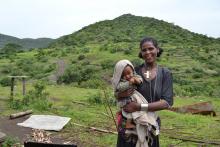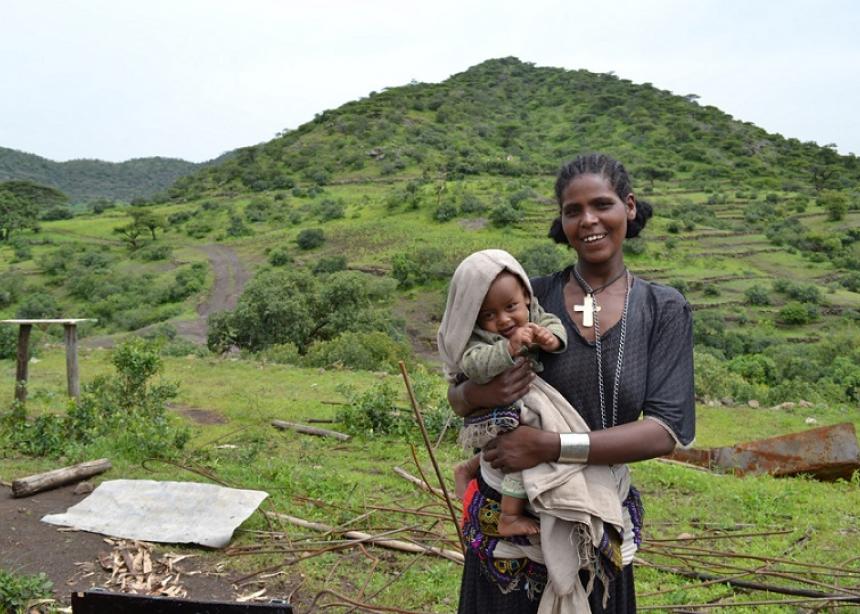Two hills, sitting side by side in a valley outside of Lalibela, Ethiopia, have a story to tell.
One hill is brown, its vegetation stripped away by livestock and deforestation. Deep gullies are carved through the hillside, where the unprotected soil was washed away by the rain. Trees have disappeared, cut down for firewood.
Look a little to the right, though, and you see a completely different picture. The other hill is green, dotted with small trees and grasses. But it has not always been this way. Only a few years ago, both hills looked the same: over-grazed, heavily eroded and deeply damaged.
That’s when residents of the surrounding area, known as Shumsha, took action. Through the support of Canadian Foodgrains Bank and a partner agency, community members came together to restore some of the nearby hills.
Livestock, which had destroyed much of the vegetation, were banned from the hill. People caught grazing their animals on the protected land would be subject to fines of up to 50 Ethiopian birr (approximately $2.50). If people didn’t pay their fines, their animal ended up in livestock “jail” until they did.
Community members also built terraces and check dams along parts of the hillside, to prevent soil erosion that had deeply damaged the hill, and planted 450,000 seedlings to hold soil in place. The community also agreed to stop cutting down trees on the hill to avoid further deforestation.
In just a few years, the change has been incredible. Unlike the other nearby hill, the protected hill is lush and green.
“New plants have emerged and we are able to see wild animals living in the protected area,” says Berzegin Yimam, a member of the local committee now responsible for protecting the hillside.
She notes that several new reliable water springs have emerged on the hillside, making it much easier and quicker to collect water. “Earlier, there was only one spring,” she says. “Every woman had to fetch water from that spring. Now there are many springs and it takes much less time.”
Many of the plants that have returned have value as an organic pesticide. And not only that; as flowers have returned, so have bees. Eighteen hives have been established on the hillside, and a group of community members are harvesting honey to sell in nearby Lalibela.
Half the profits from the hives has been set aside to purchase an extractor, to make honey processing easier, and to build a storefront where community members can sell their honey.
Farmers still have access to feed for their livestock. But instead of letting the livestock graze on the hills, which damages roots and kills vegetation, farmers cut grass to bring to their livestock. This has also created a new market opportunity for some to sell cut grasses.
But what is really important about this change is that it came from the community itself. A watershed committee of local residents has been established to develop and enforce the rules for using the hillside, making sure the hills are protected for years to come.
Protecting the environment, in other words, is also a way of protecting their future.
April 22 is Earth Day, a day set aside to show our care for the earth and to recognize the challenges faced by many of the world’s poorest people as they struggle to adapt to changing weather patterns and grow enough food to feed their families.
For more on creation care, see:
Faith leads to composting
‘I’m pretty earnest about living responsibly’
‘Holy Spirit is great choreographer’ in creation care, delegates told

Berzegin Yimam stands in front of the protected hill outside of Lalibela, Ethiopia. She is a member of the local committee responsible for protecting the hillside. Since restoring the hillside, the community has seen many benefits, including more reliable water springs and new plants that can be used to make organic pesticide. (Photo by Stefan Epp-Koop)


Add new comment
Canadian Mennonite invites comments and encourages constructive discussion about our content. Actual full names (first and last) are required. Comments are moderated and may be edited. They will not appear online until approved and will be posted during business hours. Some comments may be reproduced in print.